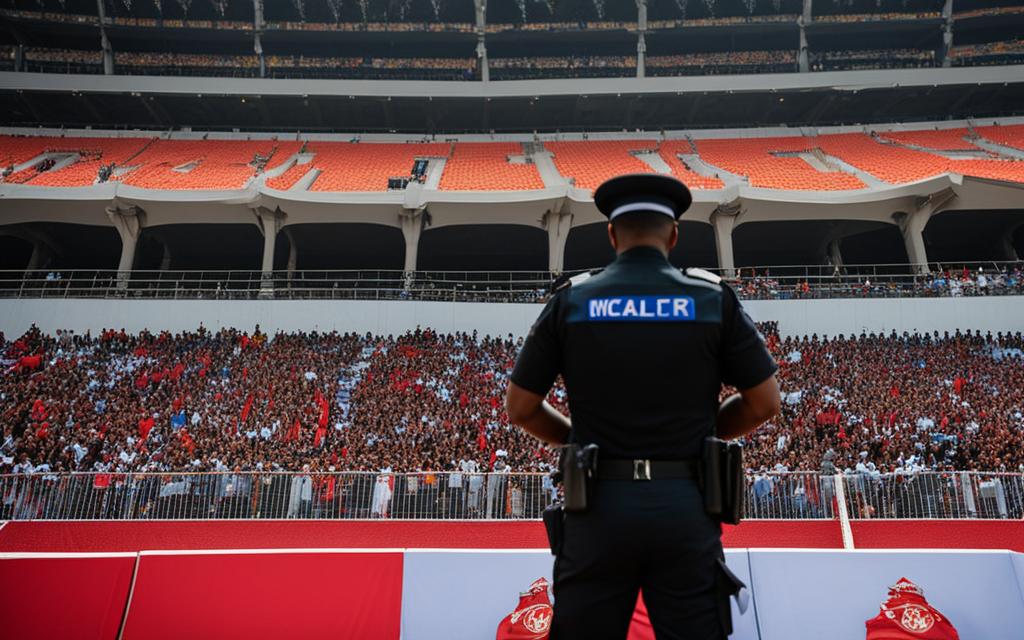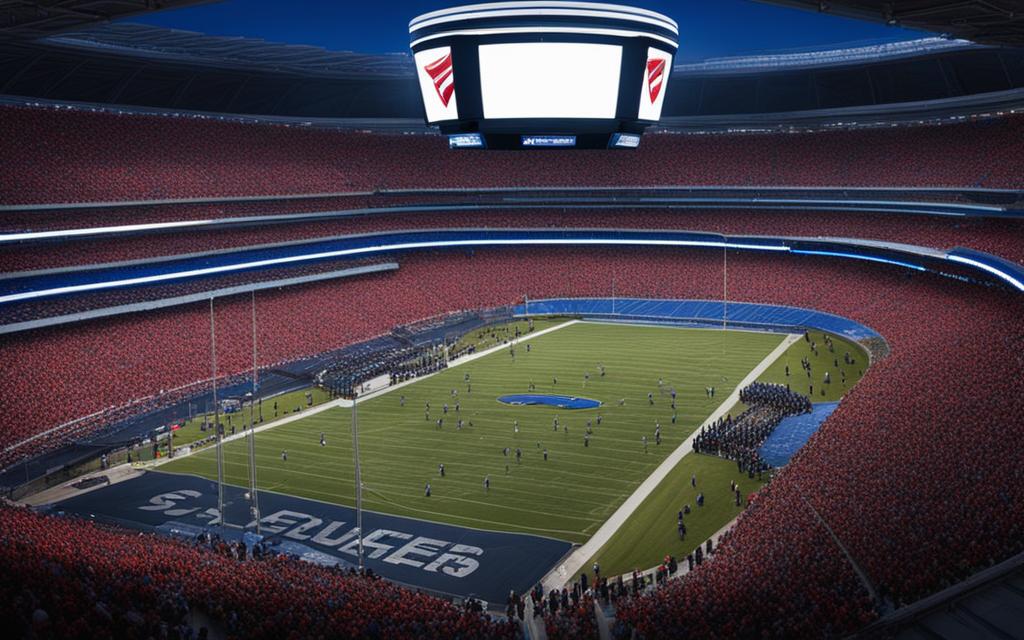In recent years, ensuring the safety and security of sporting events has become increasingly important. With large crowds gathering to watch games and matches, proper planning and implementation of security measures are critical to prevent any potential risks to attendees. Sporting event security involves various aspects, including event security services, sports venue security, event risk assessment, and event security planning, among others.
The implementation of security protocols and the role of an event security team in managing potential risks are also essential parts of enhancing sporting event security. Effective risk management for sporting events is crucial in preventing any incidents, and measures to enhance stadium security, sports venue access control, and event emergency response must be taken. Surveillance systems and access control also play a critical role in ensuring comprehensive event safety measures.
Key Takeaways
- Sporting event security involves various aspects, including event security services, sports venue security, and event risk assessment.
- Effective security protocols and a dedicated event security team play a crucial role in managing potential risks.
- Risk management for sporting events is essential in preventing any incidents.
- Measures to enhance stadium security, sports venue access control, and event emergency response must be taken.
- Surveillance systems and access control play a critical role in ensuring comprehensive event safety measures.
Strategies for Crowd Management and Event Safety
Efficient crowd management is crucial to ensuring a safe and secure sporting event. From large-scale events like the Super Bowl to smaller scale events like a local basketball game, crowd control measures are essential to maintaining order and minimizing potential risks.
One of the most important aspects of crowd control for sporting events is event safety management. This involves a comprehensive approach to managing the risks that come with large crowds. It includes measures like emergency response planning, ensuring adequate staffing levels, and implementing event safety measures.
Effective crowd control at sporting events requires careful planning and implementation of strategies that are tailored to the specific event and venue. This includes analyzing crowd behavior and developing crowd control plans that take into account factors like crowd size, venue layout, and potential hazards.
One popular strategy for crowd management is the use of barriers and barricades to control the flow of crowds. Using these physical barriers can help create designated entrances and exits, direct foot traffic, and prevent overcrowding in certain areas of the venue.
Another strategy for crowd management includes the use of signage and announcements to communicate important information to attendees. This can include reminders about prohibited items, emergency evacuation procedures, and other safety guidelines.
In addition to physical measures, technology and data analysis can also play a significant role in crowd control. Tools like surveillance systems and access control can help identify potential threats and monitor crowd behavior, allowing event organizers to respond quickly and effectively to any issues that arise.
Overall, effective crowd management and event safety require a multi-faceted approach that includes careful planning, innovative strategies, and the use of technology and data analysis. By implementing these measures, sporting events can provide a safe and secure environment for attendees and ensure a successful event experience.

Conclusion
In conclusion, enhancing sporting event security is of utmost importance for the safety and well-being of all attendees. The implementation of event security services, sports venue security, and event risk assessment are essential in achieving a safer and more secure event experience. Event security planning and the use of security protocols play a crucial role in mitigating potential risks and ensuring comprehensive event safety measures.
The presence of a dedicated event security team and effective risk management strategies are crucial for successful sporting events. Stadium security, security measures for sporting events, and sports venue access control are also significant aspects of event safety management. In the event of an emergency, the importance of event emergency response cannot be overstated.
Venue security, risk assessment, surveillance systems, access control, and stadium event security are all critical measures in enhancing sporting event security. It is vital to continuously review and improve security measures to ensure the safety and enjoyment of all attendees.
Therefore, sports event risk assessment, stadium security measures, and event safety measures are of utmost importance for ensuring a safe and secure sporting event experience. By implementing these measures, event organizers can provide a secure environment for all attendees, ultimately enhancing the enjoyment of the event.
FAQ
What is the importance of enhancing security at sporting events?
Enhancing security at sporting events is crucial to ensure the safety and well-being of attendees. It helps to prevent potential risks, maintain order, and create a secure environment for everyone.
What are event security services?
Event security services refer to the professional security measures implemented at sporting events. These services include crowd management, access control, surveillance systems, and emergency response planning.
What is sports venue security?
Sports venue security involves the implementation of security protocols and measures specific to sporting venues. It includes access control, risk assessment, and surveillance systems to ensure the safety of attendees.
What is event risk assessment?
Event risk assessment is the process of identifying, evaluating, and managing potential risks associated with a sporting event. It helps in implementing appropriate security measures and minimizing potential threats.
What is event security planning?
Event security planning involves developing comprehensive strategies and protocols to ensure the safety of attendees. It includes crowd management, emergency response planning, and coordination with security personnel.
What is the role of security protocols in sporting events?
Security protocols are established guidelines and procedures that help maintain a safe and secure environment at sporting events. They outline the actions to be taken in various situations, including emergencies and potential threats.
What is the role of an event security team?
An event security team is responsible for implementing security measures, managing potential risks, and ensuring the safety of attendees. They are trained professionals equipped with the necessary skills to handle various situations.
Why is risk management important for sporting events?
Risk management is essential for sporting events to identify and mitigate potential risks. It helps in creating a safer environment by implementing appropriate security measures and effectively responding to emergencies.
How is stadium security enhanced for sporting events?
Stadium security is enhanced for sporting events through measures such as access control, surveillance systems, and emergency response planning. These measures aim to prevent unauthorized access, monitor the premises, and respond swiftly to any incidents.
What are the security measures taken for sporting events?
Security measures for sporting events include crowd management, access control, surveillance systems, and emergency response planning. These measures are implemented to ensure the safety of attendees and minimize potential risks.
What is event safety management?
Event safety management involves the overall planning and execution of safety measures at sporting events. It includes risk assessment, crowd control, emergency response planning, and coordination with relevant authorities.
How is sports event risk assessment conducted?
Sports event risk assessment is conducted by identifying potential risks, evaluating their likelihood and severity, and implementing appropriate measures to mitigate them. It involves considering factors such as crowd management, venue security, and emergency response planning.
What are the stadium security measures?
Stadium security measures include access control systems, surveillance cameras, security personnel, emergency response protocols, and crowd management strategies. These measures aim to ensure the safety of attendees and maintain order during sporting events.
How is sports venue access control implemented?
Sports venue access control is implemented through measures such as ticket scanning, bag checks, and restricted entry points. It helps in controlling the flow of attendees, preventing unauthorized access, and maintaining a secure environment.
How is event emergency response managed?
Event emergency response is managed through the implementation of emergency protocols, coordination with relevant authorities, and training of event staff. It aims to ensure a quick and effective response to any emergencies or incidents that may occur during a sporting event.
What is the significance of venue security?
Venue security is significant as it ensures the safety of attendees and protects the integrity of the sporting event. It includes measures such as access control, surveillance systems, and emergency response planning.
Why is risk assessment important for sporting events?
Risk assessment is important for sporting events to identify and evaluate potential risks. It helps in implementing appropriate security measures, minimizing threats, and ensuring the safety of attendees.
What role do surveillance systems play in sporting event security?
Surveillance systems are essential for sporting event security as they help in monitoring the premises, detecting potential threats, and providing real-time information to security personnel. They contribute to maintaining a safe and secure environment.
How is access control implemented for stadium event security?
Access control for stadium event security is implemented through measures such as ticket scanning, restricted entry points, and proper credentialing. It helps in preventing unauthorized access and maintaining a secure environment for attendees.
What are the event safety measures?
Event safety measures include crowd management, access control, emergency response planning, surveillance systems, and trained security personnel. These measures aim to ensure the safety and well-being of attendees during sporting events.


